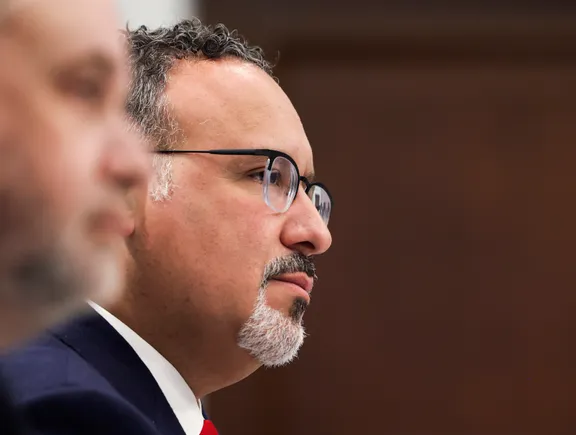Job seekers looking for higher ed executive positions often come to this publication looking for opportunities.
If that were me, I dare say after the last few months, one question I’d be prepared to answer is this one: “When do you call the cops, when it comes to campus protests?”
 Emil Guillermo
Emil Guillermo
Here’s what we should have learned by now. Police should rarely have to enter a campus situation.
Say that in an interview and you will show a rare wisdom we aren’t currently seeing on the vast majority of campuses.
The reality is protests aren’t going away until we see an Israel-Hamas ceasefire. And even then, it will only be temporary. Given that, the protests are really here to stay, at least until the heads of state figure out how to end the conflict peacefully without being viewed as antisemitic.
But the situation on campus should be controllable if people understand the role of the university and how to move forward. As long as the university and protestors are talking to each other and engaged positively, in good faith discussions, we’re moving in the right direction.
At Columbia, protestors entered and occupied Hamilton Hall only after protestors felt the university wasn’t responding to them, according to reports. Why did Columbia seemingly cut off dialogue after putting some ideas on the table, like considering greater transparency in endowment investments?
Maybe the school was impatient with the timeline of an impending graduation. It’s mistake? It needed to take the long view.
The protestors contributed by occupying Hamilton Hall in the first place, thus giving the school the reason to pick up the phone and call the police. A real law was broken, not simply a university rule.
But more than 200 arrests later, what was accomplished?
Last Monday, the main graduation was cancelled in favor of smaller ceremonies away from campus. One wonders would it have hurt to keep talking in good faith? Forget blaming “outside agitators.” They are outnumbered by students expressing who they are and what they feel politically. Students are looking for guidance where it counts, not from “outside agitators,” but from the university.
When police are called in, the university has given up and failed the students. All of them.
Remember, too, there were Jewish students among the protestors at Columbia. While it’s true that many Jews not involved in the protests felt threatened, protests have impacted all students.
One study by the University of Chicago representing some three million students nationwide, found that 58% of students who identified as Jewish and 52% who said they were Muslim, have feared for their safety since Oct. 7, the Los Angeles Times reported. Another 16% of students of other backgrounds also expressed fears.
The better way to end protests? Keep talking. Keep engaging. Take the students seriously. Encampments are a protest. Not Coachella.
Engagement is also empowering. Protests become productive when negotiations are more than lip service. Administrators can use the opportunity to teach the students, as well as learn who their students are, and what they believe politically.
By listening, you might be able to find a solution that moves everyone forward peacefully. Fear encampments? Can enough trust be built to reduce a dozen tents to one tent as a powerful symbol?
At least four campuses successfully avoided conflict and took the high road (Northwestern and Rutgers are just two of them). Why haven’t others?
If you’re a private school, everyone benefits if you expose the secretive ways endowments are invested. Public schools also benefit when people know how taxes are shared with your campus. Along the way, you might learn if students’ tuition money is used to kill innocents in Gaza.
The protests have exposed issues of transparency that might hide complicity. Is Palestinian blood linked to your campus?
That student protest leaders saw divestment in South Africa as an analogous issue shows their seriousness. Divestment is a peaceful option that can have real consequences.
I remember in the 1970s, wearing a white arm band at my graduation. Divestment took another 10 years, but it happened. There was a pathway to common ground. Protests were peaceful and respectful.
There’s no reason why they can’t be in 2024.
Just don’t call the police when there’s more talking to be done.
Talk like that and colleges that lean authoritarian by default and frustration might just see you as the solution to their problem.
Emil Guillermo is a journalist and commentator. A former adjunct professor, he writes for the Asian American Legal Defense and Education Fund.
#Engaging #Peacefully #Protestors #Diverse #Issues #Higher #Education










